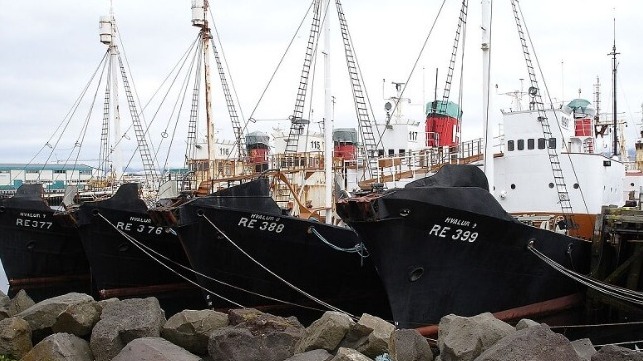Iceland Exits Commercial Whaling, Citing Lack of Demand

The government of Iceland has made the decision to formally phase out commercial whaling by 2024, citing declining demand for whale meat on the global market. The announcement closes the door on an industry that was already moribund: the nation has only one whaling company left, and it has caught just one whale since 2019.
"There is little proof that there is any economic advantage to this activity," wrote Svandis Svavarsdóttir, a member of Iceland's Left Green party, in a recent editorial. "Why should Iceland take the risk of keeping up whaling, which has not brought any economic gain, in order to sell a product for which there is hardly any demand?"
In theory, Iceland administers quotas for just over 200 fin whales and 200 minke whales per year. However, when Japan restarted its domestic whaling program after a hiatus in 2019, Japanese buyers effectively ceased importing Icelandic whale meat. Japan is the world's primary market for whale, and Iceland consumes relatively little of the meat domestically.
Iceland has a long history of artisanal-scale whaling dating back to the 12th century, and it began a large-scale industrial whaling industry in the late 1800s. It has historically defended the practice at the International Whaling Commission (IWC). Like Japan, Iceland continued a "research" whaling program after the IWC imposed a moratorium on commercial whaling in the early 1980s, drawing considerable international scrutiny and prompting a large-scale boycott of Icelandic seafood. The country formally resumed commercial whaling in 2006, awarding itself an annual catch quota, and captured about 850 whales between 2006-2018. The COVID-19 pandemic forced the cancellation of the 2020 season, and COVID continued to hamper operations in 2021.
In recent years, whale watching has become a larger industry than whaling in Iceland, and the two business sectors have conflicting interests. When COVID-19 recedes and tourism numbers resurge, Iceland's whale-watching operators will have sole access to the economic potential of this natural resource going forward.
Top image: Whaling vessels at Reykjavik (Borkur Sigurbjornsson / CC BY 2.0)
